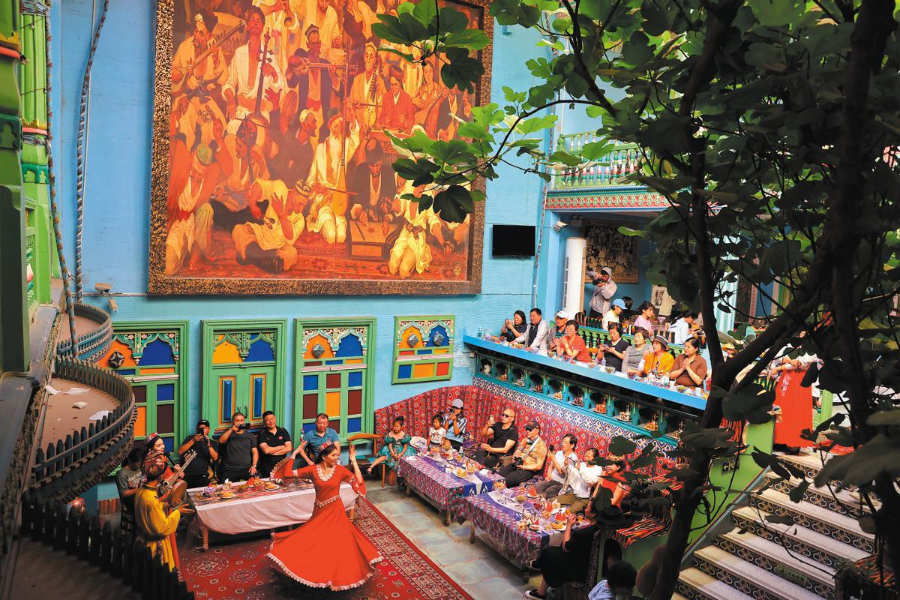
Tourists enjoy a dance performed by a Uygur artist at a homestay in the ancient city of Kashgar, Xinjiang Uygur autonomous region, on June 14, 2024. [Photo by Jiang Dong/chinadaily.com.cn]
Kashgar, an ancient Silk Road city in Northwest China's Xinjiang Uygur autonomous region, has witnessed robust growth in cultural tourism driven by efforts to protect its heritage sites and the emergence of unique cross-cultural attractions.
One example drawing visitors is Dili & Diya Cafe, run by Uygur native Dilshat Tursun and his Tanzanian wife Hadiya Msham Abdulla in Kashgar Old City, blending Tanzanian coffee traditions with local Uygur tea culture.
"Our coffee is special because it's a mixture of two cultures. Our coffee beans are from Tanzania and the milk is from Kashgar. It's a beautiful mixture of two cultures in one cup, and this is an experience unique to our cafe," said Hadiya, who first came to China in 2012 to study medicine in Fujian province before meeting Dilshat in Fuzhou in 2013. The couple married in 2020.
In 2022, when Hadiya was six months pregnant, they left their jobs in Fuzhou to pursue their dream of opening a cultural cafe in Dilshat's hometown of Kashgar. "I like making coffee and it was something that I had as a dream," Hadiya explained.
Hadiya's coffee expertise and Dilshat's appreciation for tea culture, combined with research on tourist traffic, gave them confidence in the cafe's prospects. They quickly secured a space in the old city.
"Initially our coffee beans were brought by Hadiya's African family. Now, leveraging Kashgar's statute of Silk Road logistics hub, I can more easily import the good African coffee beans," Dilshat said.
"In July, we could sell over 100 cups per day during normal times, and peaks were even higher," Dilshat said, noting that he expected the busiest season is still to come.
Dili & Diya Cafe represents one example of Kashgar's surging cultural tourism industry. During the Spring Festival in February, Kashgar's popularity surged 270 percent, with tourist traffic and revenue doubling year-on-year.
The rise of tourism came after Kashgar hosted a 2024 Spring Festival Gala sub-venue, showcasing regional culture through spellbinding performances watched globally.
Afterward, Kashgar inaugurated the gala stage adjoining to the Kashgar Old City recycling resources into 34 themed shows, over 70 productions and an immersive theatrical experience.
The Kashgar Old City achieved China's highest 5A national scenic area rating in 2015 for its iconic earthen dwellings integrating residences and heritage structures through a labyrinth of alleyways.
Meanwhile, Kashgar undertook major preservation works — redesigning and restoring buildings to harmonize seismic resilience with ethnic architectural traditions. The revamped historic quarter offers an atmosphere that is antiquated yet pristine.
Now Kashgar has become a popular traveling destination in China. Official data shows that from January to July 2024, Kashgar welcomed 28.24 million visitors generating tourism revenues of 24.12 billion yuan ($3.39 billion) — up 33.9 percent and 41.99 percent year-on-year respectively.









